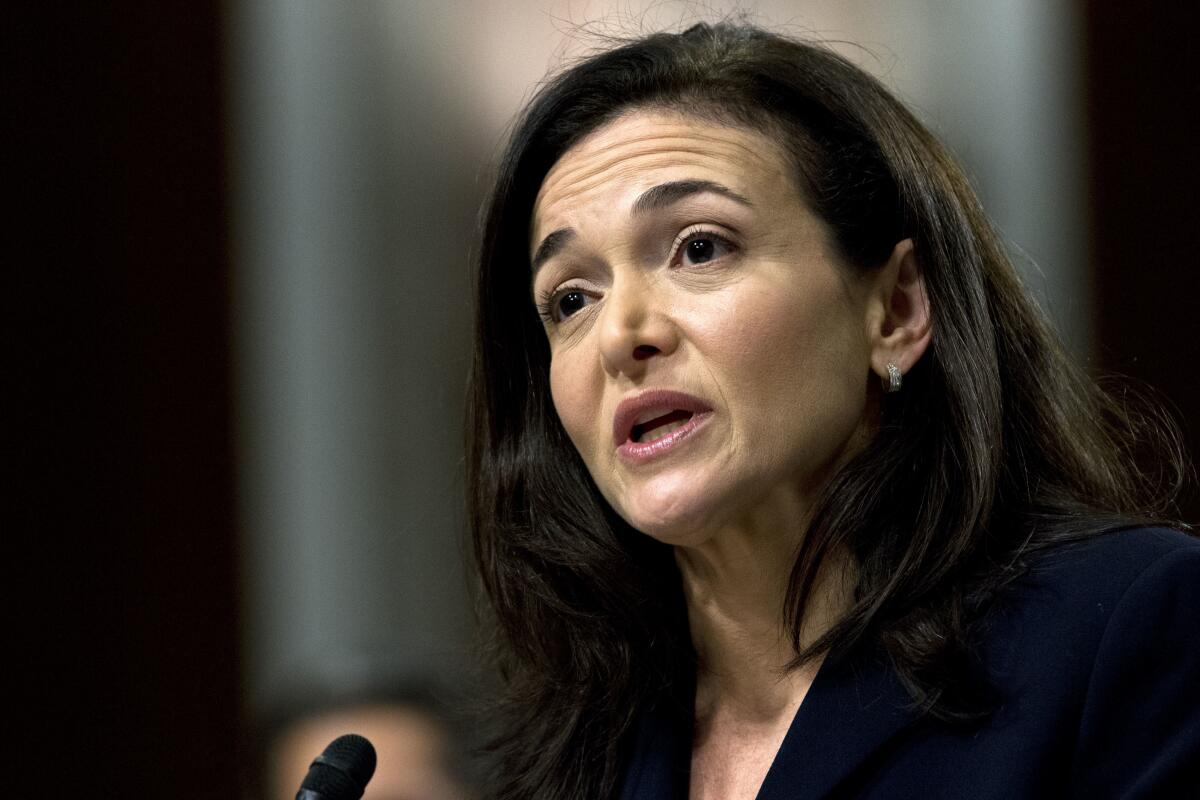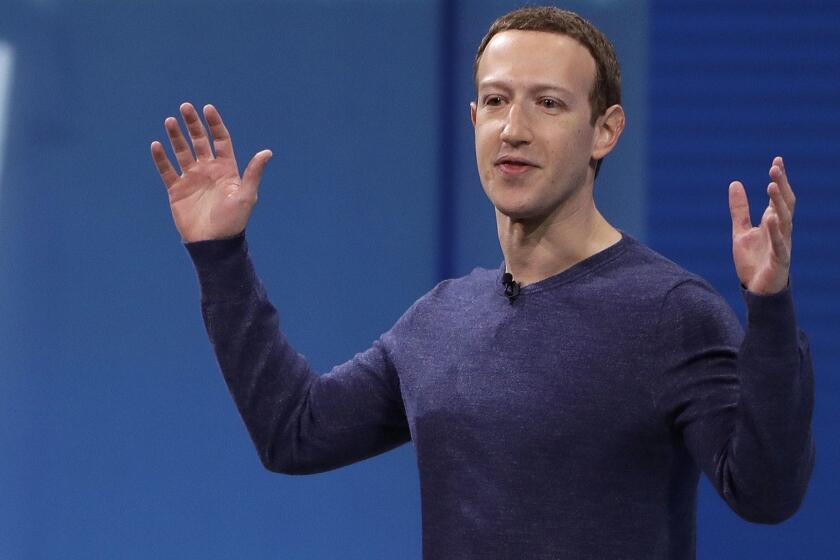Sheryl Sandberg stepping down after 14 years as Facebook’s No. 2

- Share via
When Sheryl Sandberg first joined Facebook in March 2008, the tech startup had a chief executive in his 20s, several hundred employees, a business model that advertisers didn’t quite know what to do with and a workplace culture that still bore the marks of its college-dorm origins. The company was making $150 million a year; every month, 100 million people logged on.
Taken with founder Mark Zuckerberg’s vision, Sandberg agreed to come aboard as chief operating officer — putting her second in command of what is now, 14 years later, one of the most powerful companies on the planet. These days, Facebook says it has nearly 80,000 employees; generates more than $100 billion a year in revenue; and hosts several billion monthly active users. Throughout its astronomical rise — and its recent stumbles — Sandberg has been Facebook’s most visible advocate and defender, even more so than Zuckerberg himself.
Until now.
Sandberg announced Wednesday that she’ll soon step down as COO of Facebook parent company Meta Platforms Inc., leaving an enterprise almost unrecognizable from the one she joined.
“When I took this job in 2008, I hoped I would be in this role for five years,” Sandberg wrote in a lengthy retrospective she posted — where else — on Facebook. “Fourteen years later, it is time for me to write the next chapter of my life.
“I am not entirely sure what the future will bring … but I know it will include focusing more on my foundation and philanthropic work.”
Sandberg’s exit comes at a moment of flux for Meta, which has struggled with recent scandals and leaks while also attempting to pivot toward a nebulous new vision of social networking. It also arrives amid speculation that Sandberg’s power within the company has been curtailed and that tensions between her and Zuckerberg have grown.
According to a Meta spokesperson, Sandberg told Zuckerberg this weekend about her plans to step aside. Her exit comes on the heels of a similar move by Chief Technology Officer Mike Schroepfer, who stepped down from that position in April.
Sandberg said there would be a transition process over the next few months before she departs in the fall. It won’t be a complete exit, though; the outgoing executive is slated to remain on Meta’s board of directors.
Facebook undertook a sweeping rebrand in 2021, reorganizing its titular social platform as well as Instagram, WhatsApp and other subsidiaries under a new umbrella conglomerate called Meta. The new name was a nod to the company’s growing interest in the “metaverse” — a trendy yet still quite abstract vision of the internet’s future that emphasizes virtual reality and interactive digital environments — but was also seen by some as an effort to distract from an ever-lengthening list of controversies and allegations, not to mention a core business that may be approaching maturity.
Sandberg has drawn criticism for her initial silence about the platform’s Cambridge Analytica data privacy scandal in 2018, for instance, as well as her slow response to concerns about Russian interference in the 2016 election.
In fall 2018, company insiders told the Wall Street Journal that Zuckerberg had tasked Sandberg with preventing more such scandals, putting her in a difficult, thankless position wherein any screw-ups would be highly visible to outside critics. With Sandberg in charge of defusing public relations land mines, Zuckerberg was free to focus on questions of strategy and engineering.
Sandberg “became increasingly isolated” during Donald Trump’s presidency, the New York Times reported last summer: “Her role as the CEO’s second-in-command was less certain with his elevation of several other executives, and with her diminishing influence in Washington.… It felt as though Facebook was no longer led by a No. 1 and No. 2, but a No. 1 and many.”
Mark Zuckerberg is facing a backlash from within Facebook after senior employees publicly criticized him for not taking action over posts by President Trump.
She’s also been scrutinized over reports that she tried to pressure the Daily Mail into killing an article about a restraining order that a woman had filed against Bobby Kotick, chief executive of the video game company Activision Blizzard and Sandberg’s former boyfriend. Kotick has faced allegations that he created a toxic, sexist work environment at Activision and knew for years about sexual misconduct claims within the company.
“Sandberg leaves behind a shameful legacy,” the Real Facebook Oversight Board, a watchdog group focused on the company, said in a statement Wednesday. “Her failed leadership enabled Facebook and its platforms to become the engine of disinformation that it is today.”
In February, the company reported that the number of its daily users shrank for the first time ever.
Sandberg’s public image has been shaped in large part by her 2013 book “Lean In: Women, Work and the Will to Lead,” which put forth a vision of career-centric feminism that’s been in turns heralded as empowering and criticized as overly corporate. She joined Facebook four years before the social network went public, after having previously worked at Google.
The unexpected death of her late husband, Dave Goldberg — CEO of SurveyMonkey, another web platform — formed the basis of a second book, “Option B: Facing Adversity, Building Resilience and Finding Joy.”
She has since gotten engaged to Tom Bernthal, founder of a Los Angeles consulting agency. “As Tom and I get married this summer,” her post-Facebook life will include “parenting [their] expanded family of five children,” Sandberg wrote in her announcement.
A onetime member of the Clinton administration who also maintained a relationship with Hillary Clinton, Sandberg was
Everyone’s leaning in on Sheryl Sandberg
floated as a potential Treasury secretary were the latter to get elected president — although Sandberg shot down those rumors, maintaining that she was “very happy” at Facebook.
In his own statement, also posted on Facebook, Zuckerberg deemed her exit the end of an era.
“When [Sandberg] joined me in 2008, I was only 23 years old and I barely knew anything about running a company,” the billionaire founder wrote. “Sheryl architected our ads business, hired great people, forged our management culture, and taught me how to run a company. She created opportunities for millions of people around the world, and she deserves the credit for so much of what Meta is today.”
Zuckerberg said that he doesn’t plan on directly replacing Sandberg’s role — “I’m not sure that would be possible,” he said, adding that the company is now at a place where it makes less sense to explicitly delineate business operations from product ones — but that Javier Olivan, his chief growth officer, will take the title of COO.
Olivan “will now lead our integrated ads and business products in addition to continuing to lead our infrastructure, integrity, analytics, marketing, corporate development and growth teams,” Zuckerberg said. Olivan’s current purview includes the company’s “growth efforts, integrity, ads and business platform, commerce and social impact efforts,” according to his company bio.
The Associated Press was used in compiling this report.
More to Read
Inside the business of entertainment
The Wide Shot brings you news, analysis and insights on everything from streaming wars to production — and what it all means for the future.
You may occasionally receive promotional content from the Los Angeles Times.












